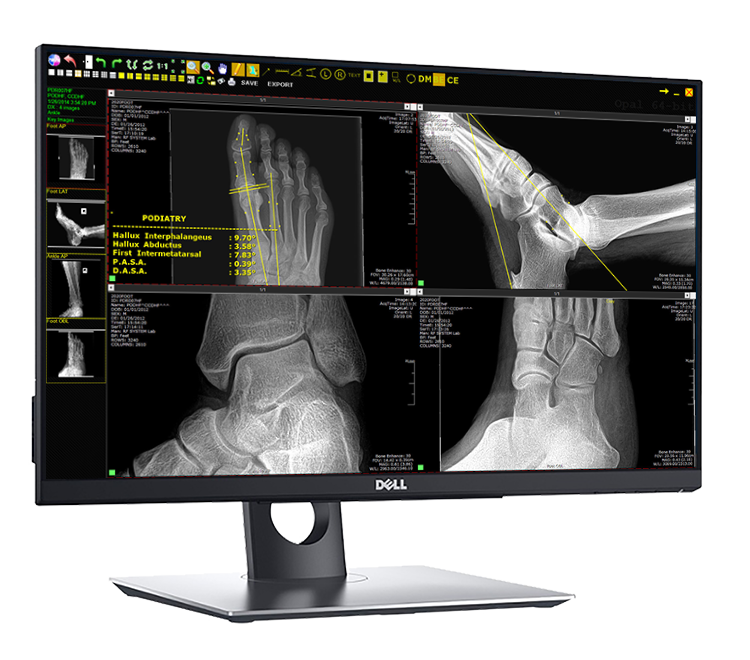Podiatry plays a crucial role in ensuring our overall mobility and comfort. Podiatrists are the key professionals for diagnosing and treating conditions related to feet and ankles. One of the most valuable tools they have in their toolkit is the X-ray machine.
While many people associate X-rays with detecting broken bones, their applications in podiatry exceed far beyond that. From uncovering hidden fractures to guiding surgical procedures, X-ray imaging has revolutionized how foot and ankle issues are treated.

In this article, we’ll dive deeper into the remarkable ways X-rays are used in podiatry, shedding light on the diverse aspects of this specialized medical practice.
How X-Rays are Used in Podiatry
The following are ten ways in which podiatrists use X-rays to diagnose an issue:
#1) Evaluation of Bone Alignment
X-rays provide podiatrists with detailed images of bone alignment and structure to better determine deformities. This is crucial for diagnosing conditions like:
- Hammertoes
- Bunions
- Degenerative conditions
- Dislocated joints
Imaging helps doctors plan better for corrective procedures. Podiatry X-ray training is recommended for those new to the technology.
#2) Diagnosis of Fractures
Podiatry X-rays are commonly used to identify breaks, fractures, and dislocations in bones. Imaging in podiatry helps to determine the extent and location of injuries in the ankles and feet, helping to guide appropriate treatment further.
#3) Assessment of Joint Conditions
Podiatrists use X-rays to assess the degree of joint damage caused by conditions like arthritis. These images help a doctor determine the appropriate treatment and management strategies.
#4) Preoperative Planning
Prior to performing surgeries involving the feet and ankles, podiatrists use X-rays to plan and visualize the procedure. This helps to ensure accurate surgical procedures and optimal outcomes.
#5) Monitoring Healing
X-rays are a valuable tool for podiatrists to track the healing process of fractures and injuries over time. They enable a professional to adjust treatment plans as needed and ensure that bones are mending properly.
#6) Identifying Infections or Tumors
X-rays in podiatry can help to detect cysts, tumors, and infections in the bones and soft tissues of the feet and ankles. This early detection aids in quick and effective treatment.
#7) Custom Orthotic Fitting
X-rays aid in the designing and fitting of custom orthotic devices. By analyzing foot structure and alignment, podiatrists can create orthotics that provide optimal comfort and support.
#8) Gait Assessment
X-rays contribute to the evaluation of gait abnormalities by revealing issues related to joint function and bone alignment. This data helps in creating rehab and gait correction programs.
#9) Follow-Up Care
X-rays in Podiatry can also be used in follow-up appointments to track the progress of treatment. This ensures that the chosen interventions are effective and allows the doctor to make any necessary adjustments at the time.
#10) Patient Records
X-rays serve as essential records for a patient’s medical history. These documents provide a visual timeline of a patient’s condition, treatment, and recovery.
Need help choosing a system? Check out our Podiatry X-ray Buyers Guide.
The Future of X-rays in Podiatry
The future of X-rays in this healthcare sector will be shaped by advancements in technology. This includes improvements in diagnostic accuracy and more of a focus on patient-centered care.
Here are some of the ways in which the best podiatry X-ray systems create comprehensive shifts in the study of podiatry:
3D Reconstruction
The use of digital X-ray technology and 3D reconstruction software is expected to become more prevalent in the field of podiatry. These technologies provide a detailed and three-dimensional image of foot and ankle structures. This aids in the diagnosis of complex conditions and helps in surgical planning.
AI-Assisted Diagnosis
Artificial intelligence (AI) algorithms assist podiatrists in interpreting X-ray images. AI will quickly analyze images, looking for abnormalities, and assisting clinicians in making more accurate diagnoses and treatment decisions.
Point-of-Care Diagnosis
Portable X-ray technology continues to rise in popularity. Portable X-ray devices are compact and lightweight, enabling podiatrists to perform imaging directly at the point of care. This enables faster diagnosis and treatment decisions.
EHR Integration
In the future, X-ray images will be seamlessly integrated into electronic health records (EHRs). This allows healthcare providers easier access and improves the continuity of care. It can also enhance collaboration among various specialists involved in the patient's care.
Telepodiatry
Similar to telemedicine, remote imaging involves patients capturing X-ray images at local facilities and sharing them with podiatrists for remote consultation and diagnosis. This approach can be particularly valuable for patients who live in remote areas or have mobility limitations.
Custom Orthotics
Advanced X-ray imaging aids in the design and creation of custom implants and orthotics. Precise measurements paired with X-rays of the foot can be used to develop orthotic devices that perfectly match a patient’s anatomy.
Minimally Invasive Procedures
X-rays help in guiding minimally invasive procedures in podiatry, like injections, aspirations, and minor injuries. Real-time imaging ensures the proper placement of needles and instruments.
Research and Development
X-rays will continue to play a vital role in podiatric research and education. Detailed images of ankle and foot structures contribute to a deeper understanding of biomechanics, treatment outcomes, and pathologies.
It’s important to note, that while these trends hold promise, the implementation and adoption of new technologies require ongoing training, research, and consideration of patient safety. ![6395230[1]](https://www.mavenimaging.com/hs-fs/hubfs/6395230%5B1%5D.jpg?width=500&height=378&name=6395230%5B1%5D.jpg)
Summing it Up
In the world of podiatry, X-rays have proven to be indispensable allies in the quest for effective treatments and accurate diagnoses. Just ten applications are listed above, but the possibilities are endless.
X-rays are a versatile solution that addresses a wide array of foot and ankle conditions. As the technology continues to advance, podiatrists can anticipate more innovative uses for X-rays, further enhancing patient care and outcomes.
Ready to get started with an X-ray system for your facility? Click here for a quote.

